If you’ve ever sprinkled basil on your pasta and watched your bearded dragon eye it curiously, you’ve probably asked yourself: Can bearded dragons eat basil? This fragrant herb is a favorite in human kitchens, but when it comes to reptiles, not all greens are created equal.
The good news? Yes, bearded dragons can eat basil—but only in moderation. While it adds a refreshing aroma and a boost of certain nutrients, basil also has some hidden risks if fed too often or in large amounts.
Bearded dragons thrive on a varied diet rich in leafy greens, vegetables, and the occasional fruit or insect. So where does basil fit into the mix? Should it be a regular part of their meals, or just an occasional garnish?
In this guide, we’ll break down everything you need to know—from basil’s nutritional pros and cons to how often you should offer it, how to prepare it safely, and what herbs to pair it with. If you want to give your dragon a flavorful boost without compromising their health, keep reading.
Can Bearded Dragons Eat Basil Safely? Let’s Break It Down
Basil might seem like a harmless herb, but not everything healthy for humans is good for reptiles. So, can bearded dragons eat basil safely? The answer depends on how it’s served, how often, and in what quantity.
Why Bearded Dragons Might Like Basil: What Makes It Appealing?
Bearded dragons are naturally curious and enjoy trying new foods, especially ones with interesting smells and textures. Basil, with its strong aroma and soft, tender leaves, can attract their attention. Younger beardies often find basil easier to chew compared to tougher greens, making it an appealing option for variety in their diet. Adding basil occasionally can keep your dragon interested in mealtime and prevent boredom with their food. However, while basil is enticing, it should never replace more nutrient-rich greens and vegetables. Offering basil as a supplement ensures your beardie enjoys a flavorful treat without missing out on the essential nutrients required for their health and growth.
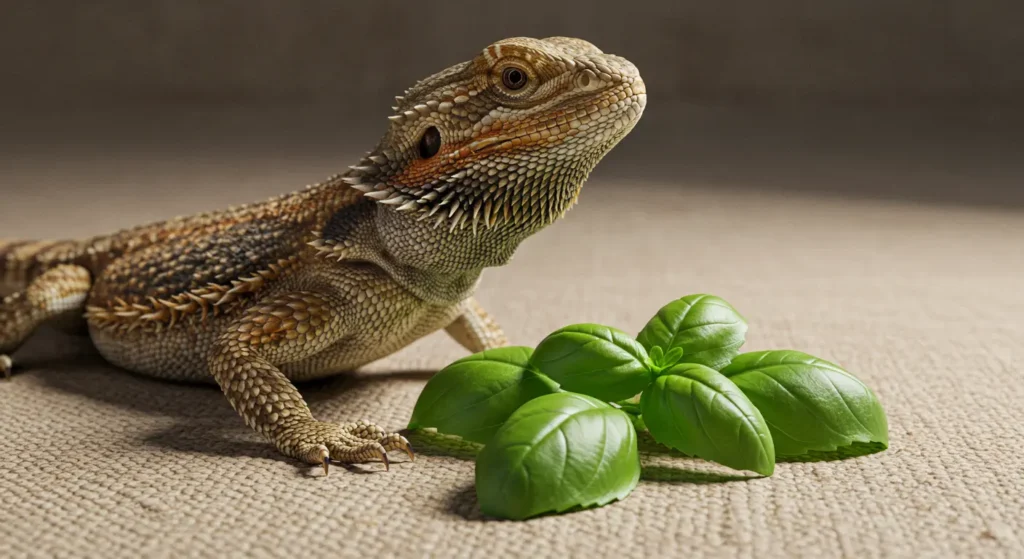
Can Bearded Dragons Eat Basil Safely Every Day or Only Occasionally?
When it comes to feeding basil, moderation is key. Bearded dragons can eat basil safely, but it should only be given as an occasional treat, not a daily staple. Basil contains beneficial vitamins but also has a calcium-to-phosphorus ratio that is less than ideal for reptiles. Feeding it too frequently can lead to nutrient imbalances, especially affecting calcium absorption, which is crucial for strong bones. Experts recommend limiting basil to about once a week, always mixing it with calcium-rich foods to maintain a balanced diet. By doing so, you can safely introduce basil’s flavor without risking your beardie’s long-term health.
Nutritional Benefits and Drawbacks of Basil for Bearded Dragons
Basil offers some nutritional benefits for bearded dragons, including vitamins A and K, as well as small amounts of calcium and magnesium. These nutrients can contribute positively when basil is fed in small quantities. However, basil lacks sufficient fiber and is not dense enough in calcium to be a primary food source. Its calcium-to-phosphorus ratio is inverted, meaning it contains more phosphorus than calcium, which can hinder calcium uptake if overfed. This imbalance makes basil unsuitable as a staple diet component but valuable as a supplement to diversify your dragon’s meals. It’s best used sparingly alongside calcium-rich greens and protein sources.
The Calcium-to-Phosphorus Ratio in Basil and Why It Matters
Reptiles, including bearded dragons, require a calcium-to-phosphorus ratio close to 2:1 to maintain healthy bones and avoid metabolic disorders. Basil has an inverted ratio, meaning it contains more phosphorus than calcium. This imbalance can interfere with calcium absorption and increase the risk of metabolic bone disease if overfed. For more detailed information on the importance of calcium-to-phosphorus ratios in reptiles and their link to bone health, see this scientific article on bone metabolism and nutrition. Always pair basil with calcium-rich foods to help maintain the proper balance.
Nutritional Benefits and Potential Risks of Basil for Reptiles
Like many herbs, basil has both benefits and drawbacks when added to a reptile’s diet. It’s important to understand what it offers and what risks to avoid.
Vitamins and Antioxidants Found in Basil
Basil is rich in vitamins A, K, and C, which are vital for maintaining healthy skin, immune function, and blood clotting in bearded dragons. It also contains antioxidants that protect cells from damage caused by free radicals. These nutrients can contribute positively to your beardie’s overall well-being when basil is offered in moderation. However, because excessive vitamin A intake can lead to toxicity, it’s important not to overfeed basil or rely heavily on vitamin supplements in addition to herbs like basil. Using basil as a small, occasional supplement adds nutritional value without risking harm.
Are There Any Toxic Compounds Like Oxalates?
Yes, basil contains natural compounds called oxalates. Oxalates can bind to calcium in the digestive tract, reducing the amount of calcium your bearded dragon actually absorbs. Over time, a diet high in oxalates may lead to calcium deficiency, which is dangerous for reptiles since calcium is critical for bone strength and metabolic processes. Additionally, high oxalate consumption is linked to kidney stone formation in some animals. This is why moderation is essential when feeding basil. Keep basil portions small and infrequent to avoid potential negative effects related to oxalates.
How Basil Compares to Other Herbs in a Reptile Diet
Compared to popular herbs like parsley, dill, or mint, basil has a softer texture and more aromatic flavor, which some bearded dragons enjoy. However, basil provides fewer minerals and less fiber than many dark leafy greens and herbs. Parsley, for example, offers higher calcium content, making it a better choice for regular feeding. Instead of relying on basil alone, use it as part of a varied herb rotation. Mixing different herbs ensures your beardie benefits from a broad range of nutrients while keeping their diet interesting and balanced.
When Basil Becomes Harmful: Overfeeding and Digestive Impact
Feeding too much basil can cause digestive issues for your bearded dragon. Basil’s essential oils and relatively low fiber content may irritate the digestive system, leading to loose stools or stomach discomfort. Overfeeding may also disrupt nutrient absorption, particularly calcium, increasing the risk of metabolic bone disease over time. To keep your beardie healthy, offer basil in small, spaced-out servings. Treat basil as a flavorful addition rather than a dietary staple, ensuring your dragon enjoys it safely without negative health effects.
How to Feed Basil to Your Bearded Dragon the Right Way
Feeding basil correctly ensures your bearded dragon gets its benefits without risks. Proper preparation, portioning, and pairing with other foods are essential. Let’s explore the best practices for adding basil safely to your pet’s diet.
Best Basil Types: Sweet Basil vs. Thai or Purple Basil
Not all basils are created equal when it comes to feeding your bearded dragon. Sweet basil is the most common and generally the safest variety to offer. It has a mild aroma and flavor that many beardies find appealing. On the other hand, Thai basil has a stronger, spicier scent and taste, which some dragons may find off-putting or unappealing. Purple basil, while safe, contains slightly different antioxidants and compounds that may have a distinct effect on your reptile’s digestion or preference.
When selecting basil, always choose fresh, organic leaves to avoid pesticides and chemicals that could harm your bearded dragon. Avoid dried or powdered basil as these have significantly reduced nutritional value. If possible, grow your own basil or purchase from a trusted organic source. This ensures the safest, healthiest basil for your beardie’s occasional treat.
Preparing Basil: Washed, Fresh, and Pesticide-Free
Proper preparation of basil is essential before feeding it to your bearded dragon. Start by washing the leaves thoroughly under running water to remove any dirt, bacteria, or pesticide residues. Pesticides and herbicides can be extremely harmful to reptiles, so always ensure your basil is organic or thoroughly cleaned.
Use fresh basil leaves rather than dried or powdered forms. Dried basil loses much of its nutritional content and may not be as palatable to your pet. Fresh basil also retains its natural aroma and moisture, which can entice your beardie to try it. After washing, remove any tough stems, as these are harder to digest and can cause choking hazards.
Serving basil fresh and clean is the best way to preserve its nutrients and flavor, making it a safe and enjoyable treat for your bearded dragon.
Serving Sizes and Frequency Based on Age and Size
When feeding basil, portion size and frequency should be tailored to your bearded dragon’s age and size. Juvenile dragons have more sensitive digestive systems and require smaller portions to avoid upset. For young beardies, one or two tiny basil leaves per feeding is sufficient. For adult dragons, slightly larger portions—around one to two small leaves once or twice a week—are appropriate.
Avoid feeding basil daily, as overfeeding can lead to nutritional imbalances, especially due to basil’s calcium-to-phosphorus ratio and oxalate content. Mixing basil with other calcium-rich leafy greens will help mitigate this risk. Always observe your dragon for any signs of digestive discomfort after feeding basil and adjust quantities accordingly.
By controlling serving size and frequency, you can safely incorporate basil into your bearded dragon’s varied diet without compromising their health.
Mixing Basil With Other Safe Greens and Vegetables
Basil works best as a flavorful addition to a varied diet, rather than a standalone food. Mix basil leaves with nutrient-rich leafy greens like collard greens, mustard greens, or dandelion greens to provide a balanced meal full of vitamins, minerals, and fiber. Adding vegetables such as squash, bell peppers, and carrots will increase fiber intake and keep meals interesting.
Including safe fruits like tomatoes in small amounts can also offer variety and hydration. Combining basil with these foods supports a diverse diet that meets all your beardie’s nutritional needs. This variety helps prevent picky eating habits and ensures your pet receives a broad range of nutrients.
For more information on safe fruit options, check out our detailed guide on feeding tomatoes safely to bearded dragons. Remember, basil should always be part of a mixed meal to maintain proper nutrition and health.
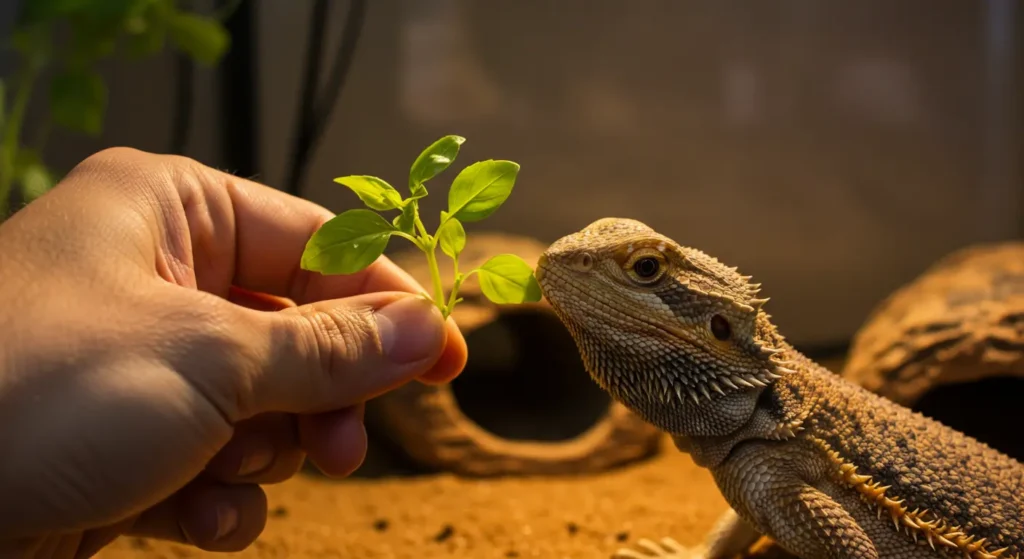
Safe Herbs and Greens Bearded Dragons Can Eat
Expanding your bearded dragon’s diet with safe herbs and greens promotes health and happiness. It’s important to know which plants are beneficial and which to avoid. Here’s a guide to popular options and tips on diet diversity.
Basil, Cilantro, Mint, and Other Common Herbs
In addition to basil, herbs like cilantro, mint, parsley, and even dill can be safe for bearded dragons when offered in small, occasional servings. These herbs provide hydration, mild fiber, and a range of trace nutrients. Cilantro, for instance, has a cooling flavor that some beardies enjoy, while mint adds a refreshing aroma to mixed salads.
It’s important to rotate herbs and not overuse them. Too many aromatic herbs can upset digestion or cause your pet to become picky. Stick with fresh, organic options and wash all herbs thoroughly before feeding. A tiny sprinkle of chopped herb on top of a salad can go a long way in encouraging your bearded dragon to explore new textures and tastes.
As always, avoid feeding any herbs that are dried, seasoned, or come from non-organic sources with possible chemical residues. Use fresh herbs as a natural, healthy way to spice up your dragon’s diet.
Greens to Prioritize: Mustard, Collard, Dandelion
When it comes to essential greens for bearded dragons, dark leafy vegetables like mustard greens, collard greens, and dandelion leaves should top your list. These superfoods are rich in calcium, fiber, and vitamins A, C, and K—all vital for bone health, immunity, and digestion.
Mustard greens are slightly spicy and help stimulate appetite, while collard greens are high in calcium and low in oxalates, making them ideal daily staples. Dandelion greens, which can often be foraged or found fresh in organic markets, are full of beneficial nutrients and antioxidants.
Rotate these greens regularly, using them as the base of your bearded dragon’s salads. They not only meet daily nutritional needs but also help prevent metabolic bone disease when combined with proper UVB exposure and calcium supplements. If you’re unsure where to start, a 70–80% mix of these dark leafy greens is a solid foundation for a healthy diet.
Plants to Avoid: Toxic Herbs and Unsafe Vegetables
Not all plants are safe for bearded dragons, and some can be downright dangerous. Toxic plants like rhubarb, avocado, chives, and onion should never be fed, as they can cause severe digestive distress or even be fatal. Rhubarb, in particular, contains oxalic acid in dangerously high amounts and is considered highly poisonous to reptiles.
Other risky options include wild-picked plants unless you’re absolutely sure they’re free from pesticides and safe to eat. Some ornamental herbs or garden vegetables may look harmless but contain compounds that can interfere with digestion, calcium absorption, or organ function.
Always do thorough research before introducing any new herb or vegetable. When in doubt, consult a reptile vet or trusted care guide. Avoiding toxic plants is one of the simplest but most crucial ways to protect your bearded dragon’s health.
Variety is Key: Rotating Greens for a Balanced Diet
Offering a wide variety of greens and herbs is essential to keeping your bearded dragon healthy and mentally stimulated. Just like humans, reptiles benefit from a diverse diet rich in different vitamins, minerals, and textures. By rotating the types of greens you feed weekly—such as switching between collard, dandelion, mustard, endive, and basil—you ensure your pet receives a more complete nutritional profile.
Repetition can also lead to boredom or food fatigue. A dragon fed the same greens daily may start rejecting meals, leading to poor nutrition or weight loss. Mixing in safe herbs and the occasional fruit slice can spark renewed interest and improve feeding response.
Don’t forget to adjust your mix based on your dragon’s age, health status, and appetite. Younger dragons may need more protein, while adults thrive on a higher proportion of greens. A thoughtful rotation plan keeps things fresh, both nutritionally and behaviorally.
Common Questions About Basil and Bearded Dragon Diets
Many bearded dragon owners have questions about feeding basil safely. This section answers common concerns with clear, expert advice. It’s designed to help you feed your pet confidently and keep them healthy.
Can Baby Bearded Dragons Eat Basil Too?
Baby bearded dragons have more sensitive digestive systems. You can offer basil, but only in very small amounts and occasionally. It’s best to focus on softer, calcium-rich greens to support their rapid growth. Always observe your baby dragon for any adverse reactions.
What If My Bearded Dragon Doesn’t Like Basil?
Not every bearded dragon enjoys the taste or smell of basil. If your pet refuses it, don’t force them. Try mixing basil with other favorite greens or herbs to introduce the flavor gradually. If they still show no interest, there are plenty of other safe plants to choose from. You can also offer occasional treats like wax worms to keep your dragon happy and interested in eating—learn more about feeding wax worms safely here.
Can I Grow Basil at Home for My Bearded Dragon?
Growing basil at home is a great idea! Homegrown basil is fresher and free from pesticides, making it safer for your pet. Ensure you use organic soil and avoid chemical fertilizers. Harvest leaves carefully and wash them before feeding.
Is Dried Basil or Basil Powder Safe for Reptiles?
Dried basil or basil powder has lower nutritional value compared to fresh leaves. They also lack the moisture reptiles need. Avoid feeding dried forms regularly, as they can cause digestive issues. Fresh basil remains the best choice for bearded dragons.
Can Bearded Dragons Eat Wax Worms as a Treat?
Yes—wax worms are safe for bearded dragons, but only as an occasional treat. These soft-bodied insects are high in fat and low in calcium, which makes them ideal for picky eaters or underweight dragons who need an energy boost—but not for regular feeding.
Offer wax worms no more than once or twice a week, and limit them to just a few per serving. Overfeeding can lead to obesity or nutritional imbalance. Use them to encourage appetite or as a reward, but always prioritize a balanced diet based on leafy greens, safe vegetables, and calcium-rich staples.
If your dragon loves basil, try pairing a few wax worms on top of their salad to make meals more exciting. Just remember: moderation is key.
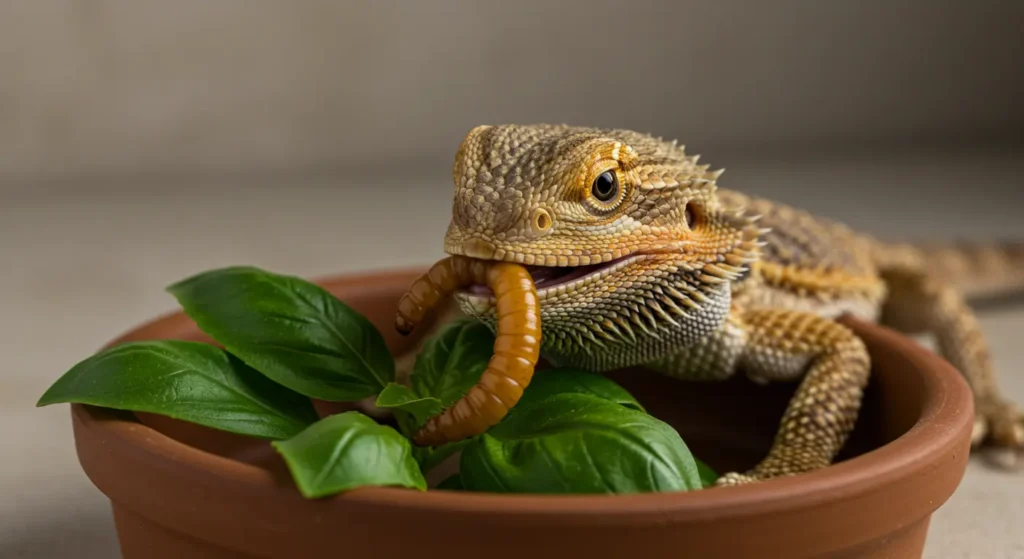
Conclusion
So, can bearded dragons eat basil? Yes, they can—but in moderation and with proper preparation. Basil offers some nutritional benefits and adds variety to your pet’s diet, but it should never replace staple greens rich in calcium.
Always serve fresh, pesticide-free basil in small amounts, and mix it with other safe vegetables and herbs to ensure a balanced diet. Avoid feeding basil daily to prevent nutrient imbalances and digestive issues.
By understanding how to feed basil safely, you can confidently include this flavorful herb in your bearded dragon’s meals. A varied diet is key to keeping your reptile healthy, happy, and thriving.

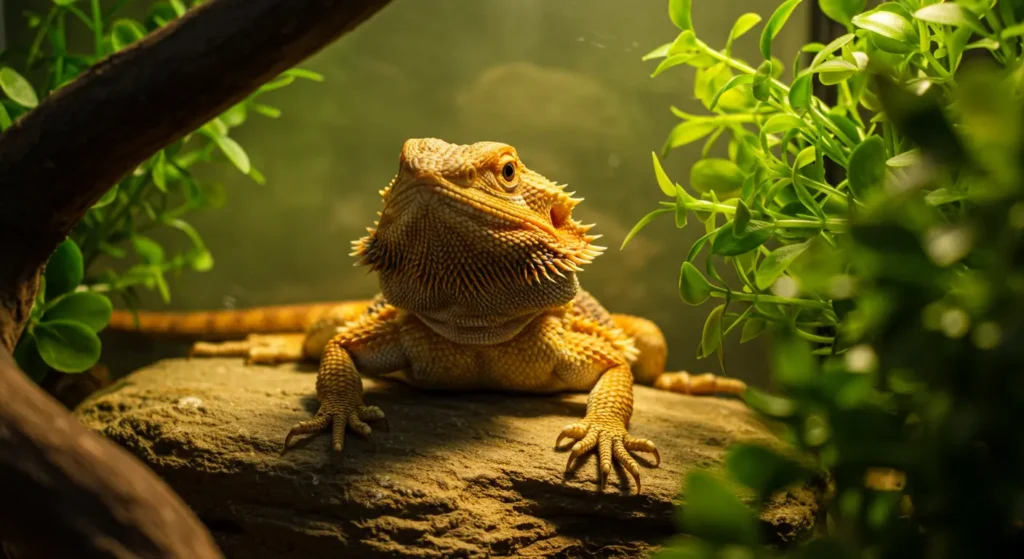

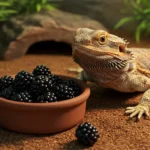
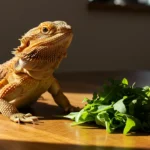
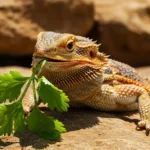
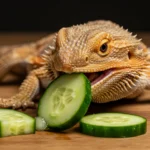
4 thoughts on “Can Bearded Dragons Eat Basil? Yes – And They Might Love It!”